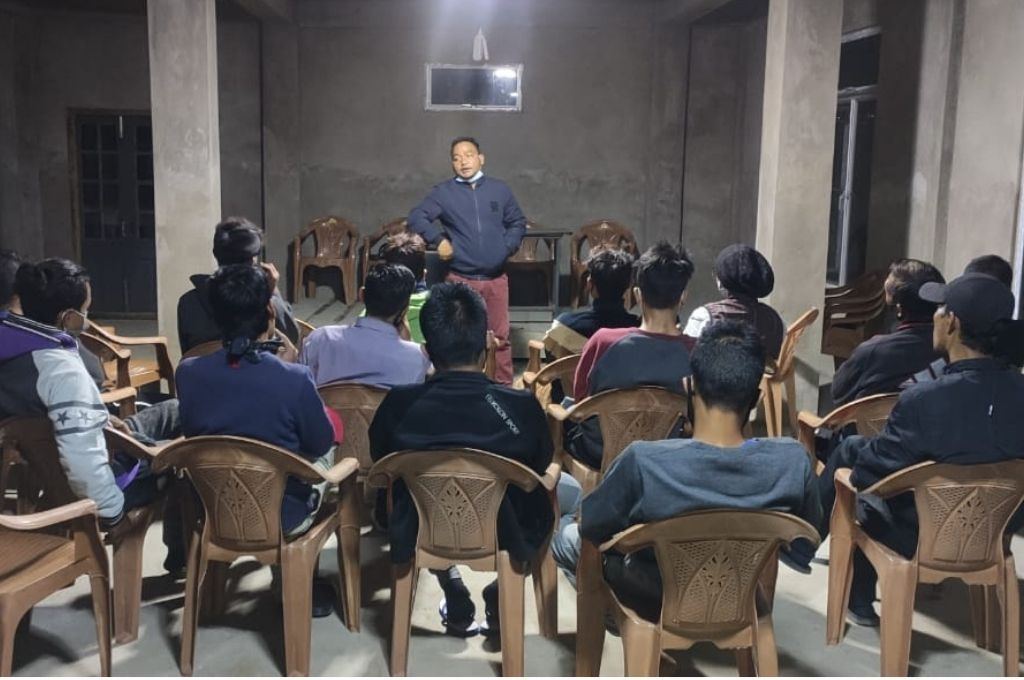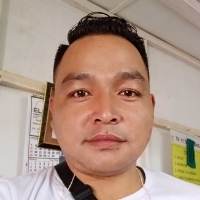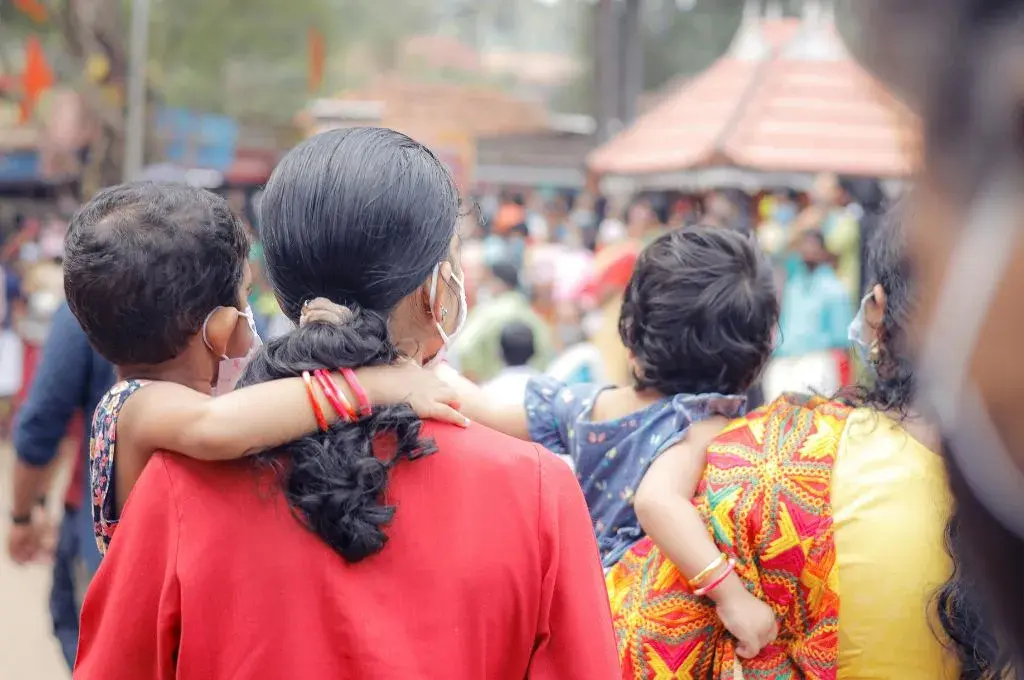My name is Albert and I work as a programme officer on Project Ahana. Project Ahana is a national programme run by the nonprofit Plan India, and it focuses on eliminating mother-to-child transmission of HIV/Acquired Immunodeficiency Syndrome (AIDS).
Growing up in Aizawl, Mizoram, I witnessed people living with HIV (PLHIV) facing a lot of discrimination. They were often moved to separate rooms or out-houses—rooms constructed underneath houses built on mountain slopes—and were completely isolated and cut off from the outside world. A close friend of mine, who tested positive for HIV, was also forced to live in a similar condition. Wanting to help him and other PLHIV, I realised it was important to first create awareness about HIV and destigmatise the disease. This pushed me to start volunteering with World Vision India, one of the country’s largest child-focused humanitarian organisations, on their HIV and AIDS programmes, in 2010.
I began working with Project Ahana in 2018 as a field worker. My work focused primarily on helping positive pregnant women (PPW) get adequate care while giving birth at an institution, breastfeeding, as well as other prenatal and antenatal care. Earlier this year, I was promoted to Programme Officer, Mizoram. In my current role, I oversee field-level workers in various districts, besides counselling the PPW, and ensuring proper medical care and attention for them. As caregivers for PLHIV, my team and I are also trying to create a safe environment for them through advocacy and outreach, and linking them with social welfare schemes and livelihood support services in order to improve their quality of life.
9.00 AM: I usually start my day by doing a quick check-in with the entire team on our WhatsApp group, about the day’s agenda. As a programme officer, I oversee a team of five field workers across three districts of Mizoram. At the beginning of the month, we plan for an average of three home visits a day to check in on PPWs, their physical and mental health, and to motivate them to seek institutional care during childbirth. However, this is not always possible as almost every day a new PPW is identified in a district. The priority then becomes to link the new PPW with an Antiretroviral Therapy Centre (or an ART centre) closest to the district, so that they can access the life-saving antiretroviral (ARV) drugs for their treatment.
10.00 AM: I have my first call of the day with a PPW. We’ve had to do most of our counselling sessions and check-ins with PPWs over phone calls or video calls, as we have had a state-wide lockdown due to the growing COVID-19 cases in Mizoram, making it difficult to conduct home visits. Moreover, she lives outside Aizawl, and the connecting road to the town where she lives is not in great condition.
I speak with her for a good hour and a half, checking to see whether she has sufficient medicines and if she is experiencing any other difficulties. The PPW is yet to disclose to her spouse that she is HIV positive. I encourage her to do this because it is essential to also test the spouses in such cases. However, the most important thing for me during the call with her is to keep her motivated, and keep her mental well-being in mind to ensure her health and that of her unborn child.

12:00 PM: I check in with another PPW on my list, who tells me she will run out of medicines by next week. Almost all ART centres are situated in far off places. In pre-pandemic times, I often used to take PPWs on my bike to visit the nearest facilities for their medical tests and counselling sessions. However, during the pandemic, we’ve had to rethink our entire working day, especially during lockdowns. Ahana teams across the country are working on ways to home-deliver the medicines to people already registered with the project. In Mizoram as well, we have analysed the database from the list of registered positive pregnant women, their spouses/partners, and exposed children, and tracked down clients who have less than a month of ARV medicines left.
As this PPW also lives outside Aizawl, I will have to apply for a travel pass in order to conduct a home visit and deliver the medicines. Fortunately, the state government has been extremely helpful and we’ve easily managed to arrange for passes whenever there has been a need.
Many PPWs are still reluctant to disclose their positive status to their families, or even have a counsellor visit them in broad daylight for the neighbours to see.
3.00 PM: After a quick lunch, I decide to visit a PPW who lives close by. I have been working with her since she first tested positive some months ago. I have to be very careful when visiting her house as she doesn’t want her family or her neighbours to know that she is HIV positive. While the stigma surrounding HIV has decreased, people are still hesitant to acknowledge it. In Mizoram, state leaders play a very important role in shaping the community’s opinions. A majority of them are Christian and work closely with the church. In the earlier years, the church refused to acknowledge and accept HIV/AIDS. Similarly, an influential youth organisation, called Young Mizo Association or YMA, showed resistance towards groups and nonprofits creating awareness about HIV. Personally, I have also faced a lot of challenges as a volunteer working with World Vision and now with Plan India. Over the years though, the church has changed its stance, and the leaders are actively working to dispel common misconceptions related to HIV, such as those about direct transmission. Regardless, many PPWs are still reluctant to disclose their positive status to their families, or even have a counsellor visit them in broad daylight for the neighbours to see.
However, it is important for me to visit this PPW frequently, as she has often shown signs of depression during our time together. And while we ensure counselling sessions with a professional as well, I like to check in on her from time to time, especially since the onset of the pandemic has worsened her mental health.
6.00 PM: I spend approximately three hours talking to the PPW, assuring her and encouraging her to continue her medication, so that our doctors can help her safely deliver her baby. Even though I have been working as a caregiver for the PLHIV community for the past 10 years, it still affects me to see a PPW so distressed about their condition.
When I return home, I spend the rest of the evening playing with my children, reading books with them—it helps me unwind and relax, if only for a little while.
9.00 PM: As I get ready for bed, I check my phone to ensure that it is switched on. When I signed on as a volunteer way back in 2010, I realised that this was not a job with fixed hours. Sometimes a PPW will call in the middle of the night because something upsetting has happened, or they are feeling depressed. Sometimes, it is a medical emergency, and I have to rush on my bike to take them to a nearby facility or hospital to get treated. Irrespective of the situation, I make sure that I can be there for them, to take care of them and their family, in whatever capacity possible.
As told to IDR.
Albert was a runner-up in the ‘Best Plan India Ahana Prerak’ category of Plan India Awards 2021. The awards, established in 2017, recognise and celebrate the contributions of all Plan India’s frontline workers.
—
Know more
- Learn more about ART treatment here.
- Read about the impact of COVID-19 on the livelihoods of people living with HIV.
- Learn more about some of India’s pioneering activists and advocates spreading awareness about HIV/AIDS.





